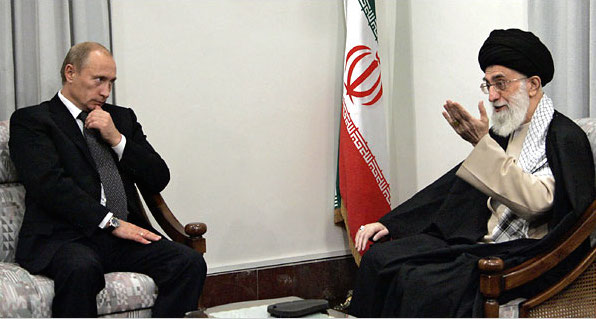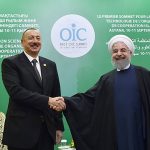by Shireen T. Hunter
Not long after the outbreak of the crisis over Ukraine and Crimea, many observers began asking the following question: what impact could renewed Russo-Western tensions have on the fate of the ongoing negotiations with Iran over its nuclear program? Will the Russians encourage Iran to become more obdurate and change its current and more flexible approach to negotiations with the P5+1 countries (the US, Britain, France, China, and Russia plus Germany), stop complying with sanctions on Iran, or even help it financially and militarily, for example by delivering the promised-but-withheld S-300 air defense system or even shipping the more advanced S-400?
Other questions are also important. Notably, what impact has the West’s treatment of Iran had on Russia’s ability to pressure Ukraine and in general to regain its influence in independent states of the former Soviet Union, including the Caucasus and Central Asia? Indeed, the Western policy of containing Iran and excluding it from many regional and transnational energy and other schemes has facilitated Russia’s policy of consolidating its position in the former USSR.
A major tool that Russia has used in its quest to regain influence over its former possessions has been its vast oil and gas reserves. This is quite evident in Ukraine’s case, where Russia has switched the gas spigot on and off as a way of pressuring Kiev. Iran is only second to Russia in its gas reserves and could have been an alternative to Russia in many countries of the former USSR, including Ukraine. Yet the Western policy of preventing any foreign investment in Iran’s energy sector, coupled with preventing any transfer of Iran’s oil and gas to Europe via various pipeline routes, has meant that Russia has gained an excessive share of the European energy market. Iranian gas could have easily been transported to Europe, especially the East European countries, through Turkey, Bulgaria and so on. Even Ukraine could have satisfied some of its energy needs through Iranian gas.
The same has been true in the Caucasus. Both Georgia and Armenia have wanted more energy cooperation with Iran. However, they were discouraged by the West and, in the case of Armenia, also pressured by Russia. The result has been their greater vulnerability to Russian pressure.
Meanwhile, preventing any of the Central Asian energy sources to pass through Iran, the only country with common land and sea borders with these countries (with the exception of Uzbekistan, which is a land-locked country), has made it more difficult for countries like Georgia to get, for instance, Turkmen gas. In other areas, too, excluding Iran from regional energy schemes, and discouraging Central Asian and Caucasian countries from cooperating with Iran, has worked either in Russia’s favor or created opportunities for China.
Even in the areas of security and conflict-resolution, Iran’s exclusion and the West’s encouraging regional countries to adopt anti-Iran policies has had negative effects. This has even given rise to new tensions and problems, for instance, between Iran and the Republic of Azerbaijan, as well as exacerbated sectarian tensions. For example, Azerbaijan’s resulting animosity to Iran has led it periodically to favor Sunni radical Islamists. Consequently, today Azerbaijan has a serious Salafi problem, and sectarian tensions in the country have been on the rise.
The experience described above provides important lessons for Western policy towards Iran and regional issues in Central Asia, the Caucasus, and South Asia. The first lesson is that a policy of containment on several fronts is not practicable, at least not in the long run. For twenty years, the US has tried to contain both Russia and Iran in these regions and to bar Iran’s interaction with these regions, while also looking askance at China’s progress.
A second lesson is that excluding Iranian oil and gas from global markets inevitably limited Europe’s and Central Asia’s energy choices, making both more vulnerable to Russian pressures since, with the exception of Qatar, the Persian Gulf oil giants are not major players in the gas market.
The last and the most important lesson is that the West should press forward with negotiations with Iran, toward a satisfactory conclusion to the nuclear dispute. This should be followed by lifting sanctions, encouraging the return of Western energy companies to Iran, and planning new networks of energy transport which would include Iran. In the long run, this kind of engagement would also translate into better political relations between Iran and the West and produce a positive impact on Iran’s political evolution and hence issues of human rights and other freedoms in Iran.
With regard to broader regional security issues, the West should work with Iran on a case-by-case basis wherever this serves Western interests, rather than making all aspects of relations with Iran hostage to its stand on the Palestinian question. As shown by the example of Afghanistan — where Iran supported US interests in toppling the Taliban, only to be deemed part of an Axis of Evil — isolating and excluding Iran harms the West as much if not more than it does the Islamic Republic. Right now, the only real winner is Vladimir Putin’s Russia.






There are many excellent points mentioned here as to why the US needs to change its policies toward Iran. However, can the author give one good reason why Iran should trust the US? One single reason? As Bush tried to say, and failed ‘Fooled me once, shame on you, fooled me twice, shame on me’. How many times has the US tried to completely destroy Iran?
I guess I have it all wrong about the Iraq/Iran war. I thought the U.S. was supplying Iraq with arms, not Russia, but then, perhaps that cagey old Saddam played both sides against each other. And why is it that Russia is actively/planning more Nuclear reactors for Iran? Let’s not forget who else in the neighborhood wants to bomb Iran back to the stone age, which increasingly looks like the motive is to eliminate competition in the oil & gas export to the E.U. I might also add, the facilities being built are also vulnerable to the same destructive process that Iran’s are, along with the U.S. partners in said ventures, would place such as a U.S. vital interest. I wonder if those so-called expert advisers to the “O” have brought this fact up, or consciously avoided doing so? Sucker the U.S. any way it can.
Russia’s contract with Iran to build five nuclear power plants poses few in any problems for the US. And the GW Bush administration foolishly failed to back Russia’s attempt to keep control of the nuclear fuel cycle for the Bushehr power plants.
How many times has the US tried to “destroy” Iran? Zero? Are you referring to the neocon conspiracy to set up an illegal war with Iran? Didn’t happen. Neocons tried, but failed.
Maybe you mean the Iran-Iraq War? Idea was more along the lines of containment, not “destruction”, of Iran.
Great post!